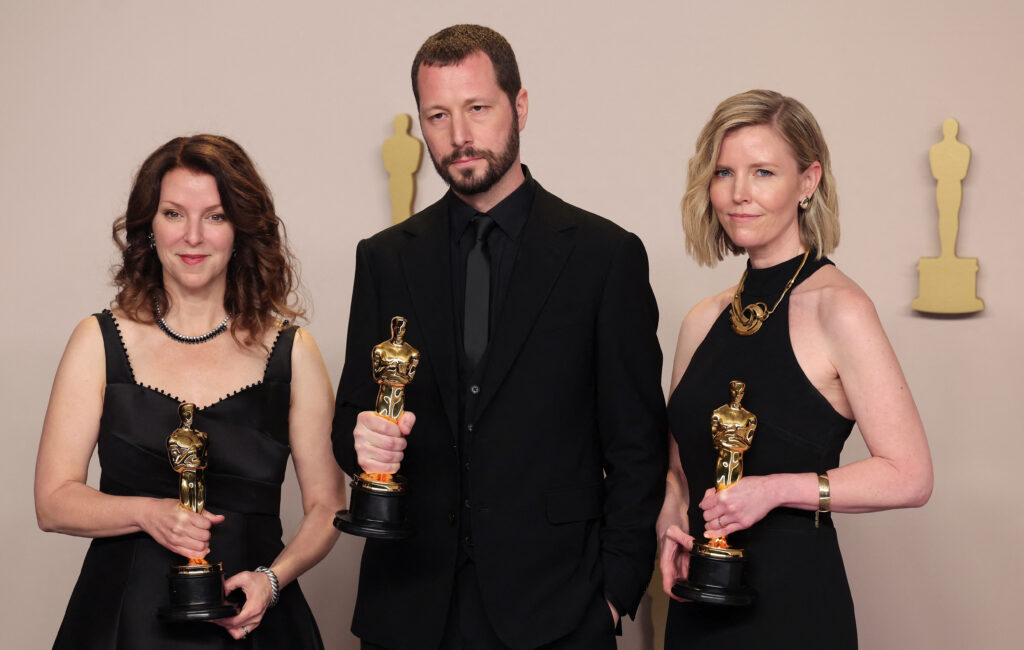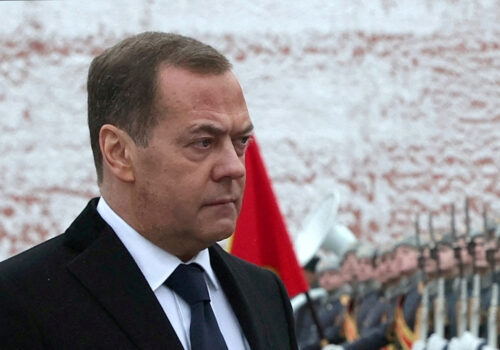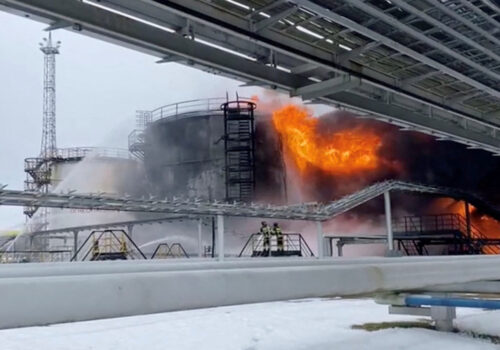Ukrainian wartime documentary “20 Days in Mariupol” won the country’s first ever Oscar at the Academy Awards in Los Angeles on March 10. For most Ukrainians, however, this was a bittersweet moment. Two years on from the harrowing events captured in Ukrainian director Mstyslav Chernov’s film, their country is still fighting for national survival against Russia’s ongoing invasion.
In a powerful Oscar acceptance speech, Chernov acknowledged the very mixed emotions that accompanied Ukraine’s cinematic breakthrough. “This is the first Oscar in Ukrainian history, and I’m honored,” he said. “Probably I will be the first director on this stage to say I wish I’d never made this film. I wish I was able to exchange this for Russia never attacking Ukraine, never occupying our cities, not killing tens of thousands of my fellow Ukrainians.”
The award-winning documentary draws on around 30 hours of raw footage recorded by Chernov as he sought to document the rapidly deteriorating situation inside front line city Mariupol as Russian troops closed in during the initial weeks of the full-scale invasion in early 2022. At the time, Chernov was working in the city as an Associated Press video journalist. He was among the last representatives of the international media to escape from Mariupol before it fell to the Russians.
Together with colleagues Evgeniy Maloletka and Vasilisa Stepanenko, Chernov is credited with informing the outside world of the horrors unfolding inside the besieged city. “Those shots that went out were very important. They went on the Associated Press and then to thousands of news outlets,” Chernov would later recall. “However, I thought I should do something more with the 30 hours of footage I had.” The Ukrainian director explained that he wanted to tell the bigger story of the siege and bring home to international audiences the scale of the death and destruction following Russia’s invasion.
The resulting documentary has met with considerable critical success. Chernov’s film first made its debut at the Sundance Film Festival, where it won an audience award. Prior to receiving Oscar recognition, “20 Days in Mariupol” was also named best documentary by the Directors Guild and BAFTA. This recognition makes the film an important contribution to international understanding of Russia’s invasion.
Stay updated
As the world watches the Russian invasion of Ukraine unfold, UkraineAlert delivers the best Atlantic Council expert insight and analysis on Ukraine twice a week directly to your inbox.
Russia’s spring 2022 destruction of Mariupol is widely seen as one of the worst war crimes of the twenty-first century. A thriving Ukrainian port city with a prewar population of around half a million, Mariupol was surrounded by Russian forces during the first days of the invasion. What followed was a siege marked by barely imaginable levels of suffering and destruction.
While there is currently no way of independently determining the overall death toll in Mariupol, conservative estimates indicate tens of thousands of Ukrainian civilians were killed. Satellite footage has identified thousands of new graves in an around Mariupol, while many more victims were buried in makeshift plots throughout the ruined city or trapped beneath the rubble of destroyed buildings. The situation has been further complicated by the large-scale forced deportation of residents by the Russian occupation authorities.
Difficulties in identifying the victims of Mariupol reflect broader obstacles to calculating Ukrainian civilian losses from Russia’s invasion. With international aid organizations barred from areas under Kremlin control, it is impossible to accurately assess the number of civilians killed by the Russian military. As a result, official figures for confirmed Ukrainian civilian losses are comparatively low. Human rights groups say this presents a misleading picture of the invasion that fails to reflect the true scale of the carnage. While UN officials have reported over 10,000 civilian deaths, they also acknowledge that the real toll is likely to be “significantly higher.”
Eurasia Center events

Chronicling the destruction of Mariupol is particularly important in light of a comprehensive Kremlin campaign to cover up evidence of Russian war crimes. Following the end of the siege in spring 2022, the Russian occupation authorities immediately began demolishing damaged residential districts and cordoning off atrocity sites such as the city’s drama theater, where hundreds are thought to have died in a targeted Russian air strike. Efforts were soon underway to rebuild Mariupol as a Russian city and repopulate it with new arrivals from Russia.
Although dozens of other Ukrainian towns and cities have been similarly devastated and remain in a state of near complete ruin, Moscow has clearly singled out Mariupol as a reconstruction priority and is seeking to transform the occupied city into a showpiece for the invasion. Meanwhile, Kremlin officials have shamelessly sought to blame Ukraine for the deaths of so many Mariupol residents. Speaking in February 2024, Russian Ambassador to Britain Andrei Kelin claimed Ukraine “could have surrendered much earlier.”
The Oscar success of “20 Days in Mariupol” should now help to undermine the Kremlin’s disinformation efforts and increase awareness about Russian war crimes in Ukraine. Ukrainian President Volodymyr Zelenskyy highlighted the importance of the award, calling it a timely reminder of Russia’s destructive goals and the need to maintain international support for Ukraine. “The horrors of Mariupol must never be forgotten,” he stated. “The entire world must see and remember what the inhumane Russian invasion brought to our people.”
Following his Oscar win, documentary maker Mstyslav Chernov echoed this sentiment. Speaking after Sunday’s ceremony, the Ukrainian director complained that Ukraine has recently become a “bargaining chip” for politicians around the world. Instead, he stressed that international attention should be firmly focused on protecting the Ukrainian civilians who are being attacked and killed. “This is not a political question. This is a humanitarian catastrophe.”
Peter Dickinson is editor of the Atlantic Council’s UkraineAlert service.
Further reading
The views expressed in UkraineAlert are solely those of the authors and do not necessarily reflect the views of the Atlantic Council, its staff, or its supporters.

The Eurasia Center’s mission is to enhance transatlantic cooperation in promoting stability, democratic values and prosperity in Eurasia, from Eastern Europe and Turkey in the West to the Caucasus, Russia and Central Asia in the East.
Follow us on social media
and support our work
Image: Mstyslav Chernov, Michelle Mizner, and Raney Aronson - Rath pose with the Oscar for Best Documentary Feature Film for "20 Days in Mariupol" in the Oscars photo room at the 96th Academy awards in Hollywood, Los Angeles, California, US. March 10, 2024. (REUTERS/Carlos Barria)




